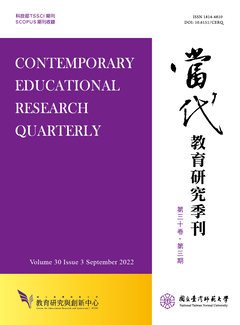

研究目的
補救教學開始走向專業化師資,教育部於 100 年推出師資基本 資格,但近年來傳統實體研習的補救教學師資培育面臨瓶頸,補救 教師師資缺口持續存在。本研究旨在透過對學習者學習背景、歷程 與經驗的分析,探討以 MOOCs 途徑作為擴充型補救教學師資培育途 徑之可行性。
研究設計/方法/取徑
本研究以一門依據教育部規定之補救教學師資研習課程架構所 設計的 MOOCs 國中階段補救教學師資培育課程為研究平台。該課程 共 13 單元,包括教學影片、隨堂作業、議題討論、大作業、課程簡 報和參考資料等 6 項學習項目。以第一期開課期間註冊的 421 名學 員為研究對象,全體學員在學習平臺的學習歷程資料以及課後調查 問卷回應的部分學員(N=65 名)兩筆不同資料分析,綜合多元資料 回應研究問題。
研究發現或結論
(1)所有註冊學員約一成完成者,其他未完成課程學員依據其 線上參與行為分未出席者、中輟和潛水學員等三類。根據整體參與 情形發現前兩個單元是學員退出課程的最高峰,隨課程陸續上線各 單元瀏覽量大體呈逐步下降趨勢。MOOCs 的學習項目中以隨堂作業 總體瀏覽量最高,議題討論次之;觀看過八成共同科目影片學員僅 佔 9.4%。
(2)課後問卷調查所得學員背景以在職教師和職前教師為主, 但有少量社會人士;學員註冊課程的主要動機包括對補救教學師培 課程內容本身、以及對 MOOCs 學習方式感興趣;持續修課的主要原 因有本課程能增進其對補救教學的認識和經驗,另外可能由於本課 程架構符合教育部規定,期待獲得完成修課證明為持續修課的次要 原因。
(3)本研究綜合學員背景、滿意度和參與者在線上學習的表現 等資料,支持 MOOCs 作為教師研習之擴充形式的可行性。回應問卷 之學員普遍肯定本課程內容與形式,以及自身學習收穫;能開放研 習對象包括在職教師、社會人士等多元背景,且不限時空、進度的 研習方式滿足學員個別化的專業發展需求,一期完成的人數和學習 表現不亞於一般實體研習,且具重複運用等優勢。
研究原創性/價值
本研究將教育部規定之補救教學師資培育課程首創採 MOOCs方式,試圖以 MOOCs 的優勢探討補充補救教學師資培育之可行性, 並在首次實作經驗採多元資料獲得本土運用成效,對臺灣學習者對 師資培育的線上課程提供本土的樣貌。
教育政策建議或實務意涵
本研究之結果反映出臺灣對於 MOOCs 途徑運用在補救教學師 資培育或推廣補救教學專業知能之真實結果,採用 MOOCs 補充不易補足的教師專業知能確實可行,本研究發現線上學習的不同類型、學 習者對 MOOCs 線上活動的反應,所得之結果均可作為未來 MOOCs運用在其他教師進修課程之參考。
Purpose
Massive open online courses (MOOCs) offer open courses to the public. The professional knowledge of remediation received attention when the 18-hour basic course was made a requirement for teacher preparation by the Ministry of Education in Taiwan. There is a shortage of professional development resources for remedial teachers. This study aimed to investigate the feasibility of the application of MOOCs to the required Remediation Teacher Preparation program.
Design/methodology/approach
“Every Student Can Succeed: Effective Remediation” was designed as an xMOOC and was opened to the public to meet the demand for professional development. Six types of learning activities were designed: video, homework, issue-discussion, project, PowerPoint slide, and reference. There were 421 students registered for the online course. Students’ learning behavior data and a post- course online survey were collected from 65 participants. The data were analyzed to answer the research questions.
Findings/results
1. Approximately 10% of enrolled students completed the courserequirements. Three types of participants were found on the basis of participation behavior: the no-show, drop-out, and lurker. They showedsignificantly different behavior online. Participation decreased as theunits advanced and the most significant decrease occurred after the second unit. The “homework” was the learning activity that received the most visits, followed by “issue-discussion”.
2. The survey found that the highest proportion of participants were teachers or teacher trainees. Some of the participants did not work in schools or study education but enrolled for personal interests. Most participants reported positive attitudes toward MOOCs and considered MOOCs as a potential way to provide professional development for remediation.
3. The varied backgrounds of the participants, the positive feedback from them, and the number of participants, all supported the feasibility of the MOOC for remediation teacher training.
Originality/value
The application of MOOCs to remediation teacher training is in the trial stages in Taiwan. The results and suggestions of this study provide information for further consideration for online teacher development programs.
Suggestions/implications
The results of this study reflect the actual outcome of the application of MOOCs in remedial instruction and teacher training in Taiwan. The study also supports the feasibility of using MOOCs to supply remedial teacher professional development which is difficult to meet the needs. The study also unveils different modes of learning and participants’ responses to online learning activities. The aforementioned results provide a reference for future teacher development programs based on MOOCs.

This work is licensed under a Creative Commons Attribution-NonCommercial 3.0 Taiwan License.
Center for Educational Research and Innovation, National Tawain Normal University
162, Ho-Ping East Rd, Sec. 1, Taipei, Taiwan | Tel:+886-2-7749-3670 | E-mail: cerecerq@gmail.com
CERI | NTNU | E-mail Alerts | Open Journal System
© 2014 CERI-NTNU
